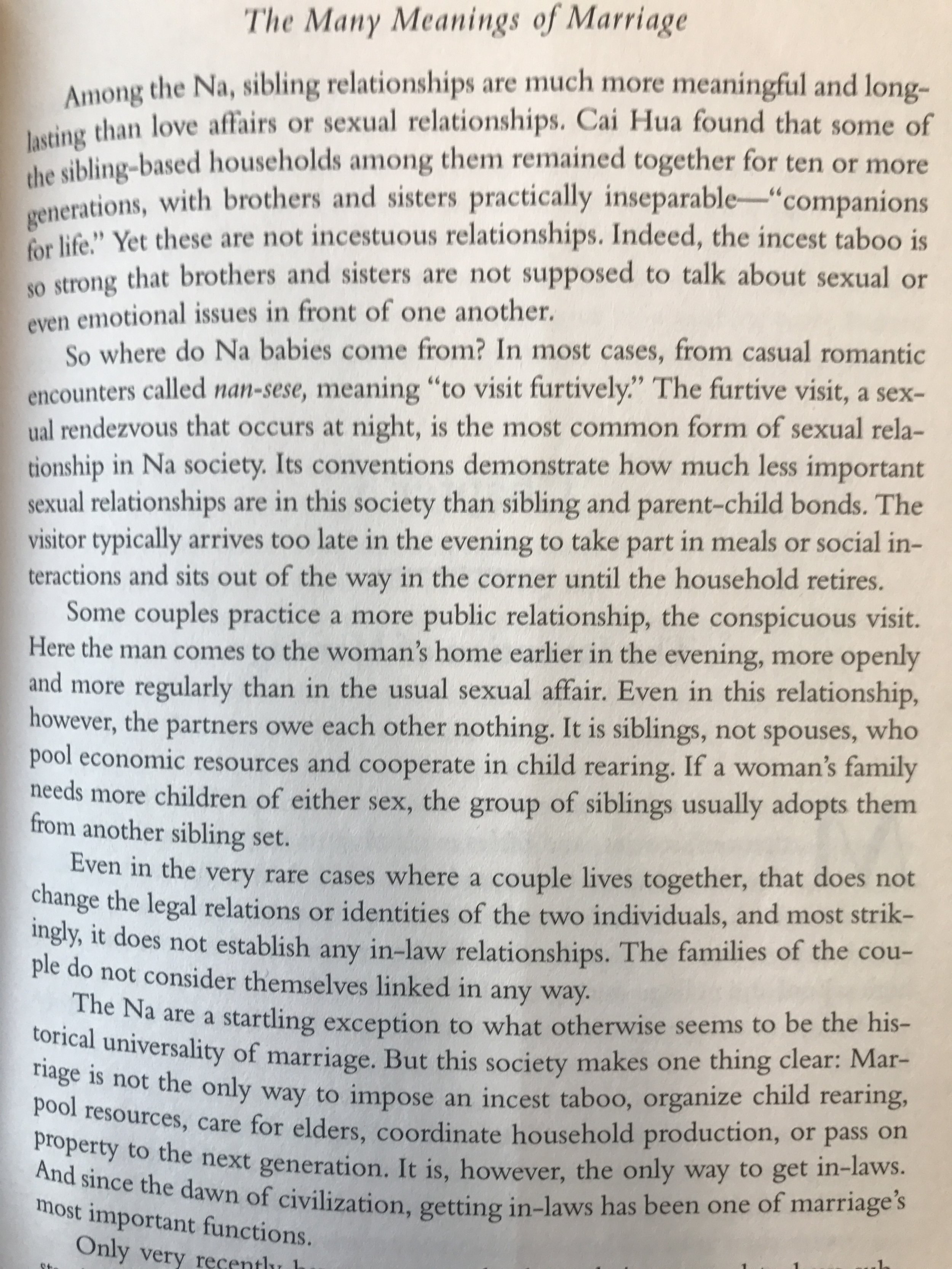Book Review: A Short History of Marriage (from 1913!)
What is this book about?
This book is a survey of marriage customs from a variety of cultures and countries around the world. It does have one historical chapter on "Marriage Among the Ancients." Most of these chapters are just little snippets discussing each tradition in turn and then moving briskly on to the next one.
Warning: Because this book was originally published in 1913, it uses some language and viewpoints that are pretty offensive to modern society. For example - the entire first chapter is titled "Primitive Marriage" and reviews customs among Native American tribes (referred to as "Red Indians"), African cultures and various other groups that somehow fall under "primitive" for no discernible reason I can tell (Hindu people? Aborigines? Scandinavians? What?)
There are also some occasional references to people that were probably experts and very well known in 1913 but are.....less known today. I was a little confused when page 5 of the book started waxing poetic on what "Lord Avebury" thinks about the nature of early marriage. Fortunately, Lord Avebury has his own Wikipedia page so I was able to learn a little about him. He apparently invented the terms Paleolithic and Neolithic. Sidenote: Lord Avebury would be an excellent name for a cat.
Lord Avebury (John Lubbock, 1st Baron Avebury) and his excellent beard.
Further sidenote: If you google Lord Avebury and marriage you'll find that he's quoted in a ton of pre-1920 texts on the subject, including a six volume set on the history of marriage published in 1891. I must investigate further and write more blog posts. ALL THE AVEBURY.
Who would love this book?
A lot of people might enjoy reading this book! It does seem to concentrate on more of the less traditional and more unusual traditions from around the world, so it's really amusing if you're into that sort of thing or get a kick out of old-school books. However, because it's old, it looks like copies of this are going to be pretty expensive to find. Even reprints are running $30 +. I honestly don't think I'd pay that, but if you can find it at a library, I highly suggest it. It's really entertaining.
My Favorite Parts
There are like four whole pages dedicated to the custom of giving "a flitch of bacon [half a pig] to any pair who could come forward and state on oath, after a year of marriage, that they had never once quarrelled or regretted their marriage during the year," celebrated in Dunmow and Whichnoure in England. There's an entire account of a parade held in honor of the ceremony of the awarding of the Dunnmow flitch of bacon. It's glorious. This tradition is apparently still going on. This blog post talks about it and includes PICTURES, so you should go check it out.
There are also several pages in the "Marriage Superstitions and Omens" chapter dedicated to the best and worst days and months to get married among various cultures. Apparently, February 11, June 2, November 2, and December 1 "are considered the most unpropitious days of the year on which to get married" (according to either English custom, ancient Roman tradition, or the Roman Catholic Church? This book doesn't cite its sources very clearly). This amuses me, as my wedding day is June 2, 2018. I must tell John that our date is unpropitious.
Some other superstition jewels:
"A woman should not marry on the day of the week of her birth."
"If there is a cat in the house, the bride must feed it herself on the wedding day, otherwise the day may prove rainy."
"If you cut your nails on a Saturday your lover will call on Sunday."
"The bride should always buy something as soon as she is married, and before the bridegroom can make a purchase. 'Then she'll be master for life!' say the old women. It is customary for brides to buy a pin from their bridesmaids in order to retain the mastery of their husbands."
"Hindoos believe that anyone who kills a frog will never be married."
Also, apparently in certain parts of Germany, it used to be customary on the wedding eve ("polterabend") to throw out of the window every article of crockery or glass which is cracked or broken.
Also also, if you want to say no to someone's offer of marriage in certain parts of Thuringia, a sausage is placed on the table at meal-time when the suitor arrives.
Karen weddings in Burmah are conducted at funerals!
Basically I could include fun trivia from this book all day, but I have to return it the library at some point.
Does it talk about marital surname changes at all?
Only very briefly in passing. For example: "Among the Ainus a married woman does not take her husband's name. She either uses her maiden name or is designated as 'the wife of So-and-so.'" (the Ainu are an indigenous people of Japan)
Amazon Link: https://www.amazon.com/Short-History-Marriage-Folklore-Countries/dp/1447456130









